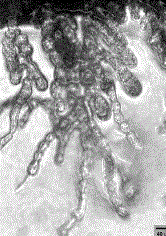 A new strain of algae found growing in the snowy Rocky Mountains could provide a promising feedstock for biodiesel. This story in Science Daily says heterococcus sp. DN1, a new variety of yellow-green algae, grows at near freezing temperatures and accumulates large amounts of lipids, working best at high light at the low temps:
A new strain of algae found growing in the snowy Rocky Mountains could provide a promising feedstock for biodiesel. This story in Science Daily says heterococcus sp. DN1, a new variety of yellow-green algae, grows at near freezing temperatures and accumulates large amounts of lipids, working best at high light at the low temps:
Algae that can grow in extreme conditions and accumulate lipids are of great interest to industry. The team found that as H. sp. DN1 produces the highest quantity of lipids when grown undisturbed with high light in low temperatures, it is a potential source of lipids for human nutrition when grown undisturbed, and it has an ideal lipid profile for biofuel production when stressed.
 “We have isolated and characterized a new cold-tolerant lipid-producing strain of algae from the Rocky Mountains in Colorado, US,” said Dr. David Nelson [Department of Plant Biology at the University of Minnesota]. “This may have implications for the commercial production of algal lipids at northern latitudes where the culture of other algal species is limited or impossible.”
“We have isolated and characterized a new cold-tolerant lipid-producing strain of algae from the Rocky Mountains in Colorado, US,” said Dr. David Nelson [Department of Plant Biology at the University of Minnesota]. “This may have implications for the commercial production of algal lipids at northern latitudes where the culture of other algal species is limited or impossible.”

